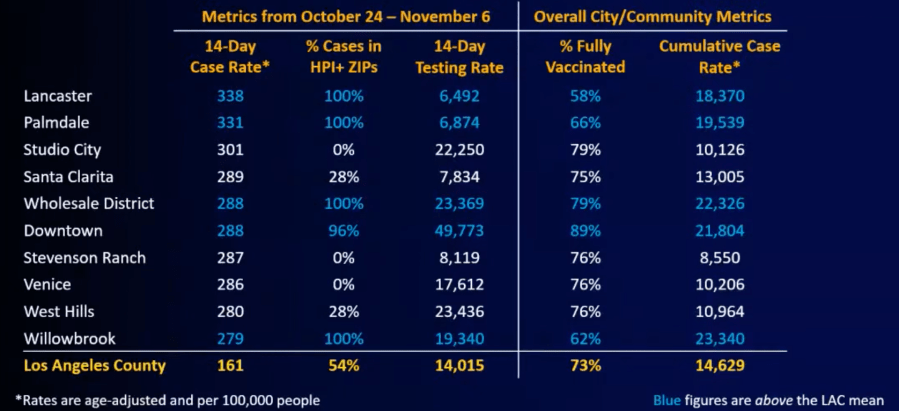Health officials on Thursday highlighted ten Los Angeles County areas that became COVID-19 “hotspots” in recent weeks amid ongoing concerns about the region potentially seeing another winter virus surge.
Lancaster, Palmdale, Studio City, Santa Clarita, Venice, downtown L.A., the wholesale district, Willowbrook, West Hills and Stevenson Ranch were all areas singled out for having high coronavirus case rates.

Data collected between Oct. 24 and Nov. 5 found that Lancaster, Palmdale, downtown L.A., the wholesale district and Willowbrook in particular not only had high 14-day infection rates, but also very high cumulative case rates, L.A. County Health Director Barbara Ferrer said in a media briefing.
“The fact that these communities are current hotspots of transmission suggests that even high rates of past infection are not enough to protect them from these current waves of infection,“ Ferrer said.
Ferrer added that there’s not one common issue at all ten of those communities that the health department can point to to explain the high case rates.
Three of the “hotspots” had lower-than-average COVID-19 vaccination rates, but others had “really decent” vaccine coverage, Ferrer said.
Vaccination rates in Lancaster (58%), Palmdale (66%) and Willowbrook (62%) were lower than the countywide rate.
But that wasn’t the case in Studio City, Santa Clarita, the wholesale district, downtown L.A., Venice, West Hills and Stevenson Ranch, which all had vaccination rates of 75% or higher.
That doesn’t mean vaccination rates aren’t a factor.
“If you’re not vaccinated, you got a much higher risk of ending up infected, ending up in the hospital and tragically passing away. So that’s crystal clear,” Ferrer said.
The health department is still looking into why those ten communities became “hotspots.”
Only a very small number of the cities had recent outbreaks, and there was no discernible pattern, Ferrer said.
One common theme did stand out: The median age of people who recently tested positive in those communities was between 26 and 36 years old.
“Given the relatively young age of many of those infected, intermingling at work and socially is likely to play a role in increasing your transmission risk,“ the health director said.
“This is essentially a pandemic that is, in fact, fueled by younger people,” she added.
Still, Ferrer said there’s one message for everyone in the county, not just younger residents.
“Whoever you are and wherever you live, whether you live in a community with a high vaccination rate or with not so high vaccination rates, the most important thing is you as a person are going to need to do is get yourself vaccinated, get the people you love vaccinated, and then be sensible about precautions around intermingling,” she told L.A. County residents.





















